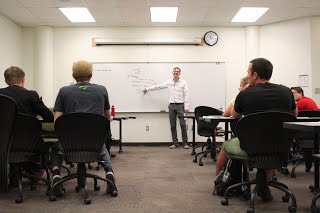About the Utah Lyceum
Introduction
 We are a group of philosophers who are engaged in the project of introducing critical reasoning and philosophy to pre-college students.
We are a group of philosophers who are engaged in the project of introducing critical reasoning and philosophy to pre-college students.
We consider a philosophical education too important to wait until adulthood, and to that end we are currently organizing a summer camp aimed at introducing philosophy and logic to Utah youth. The idea is to serve both the Cedar City and University communities by providing interested area youth with an exposure to formal critical reasoning skills and a philosophical education. The summer camp is free to any interested local students (age 13 and up), and will take place for five days.
Our primary aim in offering this program is to introduce local youth to careful critical reasoning and philosophy at the pre-college level. It has already been well established that college philosophy students fare significantly better than many other students on graduate admission exams (see, e.g.: USC School of Philosophy Statistics).
We are a sister program of the Illinois Lyceum, the Iowa Lyceum, and the new West Michigan Philosophy Lyceum programs and will utilize the summer camps both as a way to spread philosophical discourse to younger students and to examine the ways in which a philosophical education can positively increase readiness for the rigors of college, and most importantly clarify reasoning.
Statement of History and Purpose
The Illinois Lyceum was founded in 2010 by Alexis Dyschkant and James Jeffries with the mission of providing a unique kind of education to Champaign-Urbana’s youth – philosophical evaluation and critical thinking. In 2011, Illinois Lyceum debuted as a summer philosophy academic program for local high school students. Now, Illinois Lyceum has grown into the Lyceum Organization which oversees summer philosophy programs nationally, and provides education to students ages 12-18. Some things have not changed; our program remains free to participants, targets under-represented youth, and relies on local support for a successful term.
Our mission is to encourage students to learn to reflectively engage with educational material and make reasoned life decisions. In the 1970s, philosophers of education began researching the impact of philosophical education, including logic, perspective taking, projective problem-solving and ethics, on youth.[1] Not surprisingly, studies concluded that students who received even minimal philosophical education excelled in a broad range of classes and standardized testing as a whole. Despite this, philosophical education is almost non-existent in youth education. Only a small amount of public schools provide philosophy in their curriculum. The Lyceum programs, therefore have two goals, to give our community’s youth access to philosophy and to provide data to support systematically introducing philosophy into public school curriculum. In the Illinois Lyceum 2012, we began testing students using a common test in psychology: the Cognitive Reflection Test (CRT). The CRT tests for one’s ability to reflect on problem-solving by presenting questions with intuitive, wrong answers. Most people quickly report wrong answers; philosophers engage in a reasoned method using logic, critical reflection, and unbiased perspective taking. These are the three skills we focused most on in our 2012 curriculum.[2] After one week, our students tested slightly higher than the average college student on the CRT.[3]
 The Iowa Lyceum was founded in 2013 by two philosophy graduate students at the University of Iowa, Kristopher Phillips and Gregory Stoutenburg. They reached out to the Illinois group and received some help in setting up a program of their own.
The Iowa Lyceum was founded in 2013 by two philosophy graduate students at the University of Iowa, Kristopher Phillips and Gregory Stoutenburg. They reached out to the Illinois group and received some help in setting up a program of their own.
Dr. Kristopher Phillips has since graduated from the University of Iowa and taken on a position at Southern Utah University. With his colleague in the philosophy program, Dr. Kirk Fitzpatrick, Dr. Phillips has founded the Utah Lyceum. The Utah Lyceum benefits from the already established pedagogical techniques, and Phillips's experience with the Iowa Lyceum. We hope that within the next few years, the Utah Lyceum will expand at the rate of both the Illinois and Iowa Lyceums and become a permanent feature of the Cedar City community.
[1] See the work of Linda Annis and David Annis including "The Impact of Philosophy on Students’ Critical Thinking Ability" (1979).
[2] Sessions included: “Power and Observation: Social Philosophy”, “Governing Ourselves”, “Ethical Eating”, “Nietzsche: Nihilism and Truth”, “Logic and Reasoning”, “Personal Identity”, “Time Travel: Resolving Paradoxes”, “Humanity: Man, Animal and Other”, “The Statue and The Clay: Eastern Philosophy”, and “Minds and Machines”.
[3] The average college student scored a 1.26/3.00. Our students scored a 1.27/3.00.
